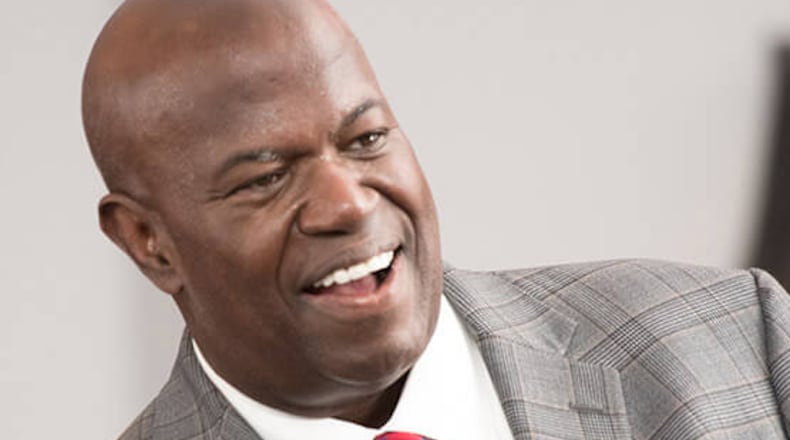Noel Khalil made a career out of building “cathedrals for God’s children.”
The Atlanta businessman, who championed affordable housing in metro Atlanta and across the Southeast, died Oct. 25 after a four-year battle with chronic lymphocytic leukemia. A service, held Nov. 4 at St. Philip A.M.E. Church on Candler Road, attracted top Atlanta political and business leaders and entertainers.
“For generations to come there will be places of dignity, places that are safe, places that are whole, places full of love because Noel loved us so very much,” said Atlanta Mayor Keisha Lance Bottoms during a eulogy.
Bottoms gave Khalil’s surviving family members the Phoenix Award, the city’s highest honor.
Khalil was founder of Columbia Residential, a company that redeveloped public housing projects in Georgia, Florida, Texas and Louisiana, turning them into apartment communities with upscale features such as state-of-the-art recreation facilities, internet cafes and units Bottoms described as “beautiful clean places.”
Khalil’s death coincides with the emergence of affordable housing as a key issue in the race for Atlanta mayor.
Atlanta rapper and political activist Killer Mike called Khalil a “hero” who transformed the “lives of his children, the life of his community, the lives of his business partners.”
“He brought Black and white people in coalitions together,” he said. “He made housing decent and respectable.”
Columbia, which Khalil founded with one partner in 1991 under the name Affordable Housing Partnership Inc., today employs 350 people. The company manages 50 properties with nearly 10,000 units and currently has eight developments under construction.
A sister company, Columbia Ventures, which Khalil founded in 2013, develops high-density mixed-use residential projects connected to public transit.
Khalil’s developments include thousands of mixed-income residences in East Lake, Mechanicsville and the West Highlands in Atlanta. Khalil’s highest profile development, Columbia Parc, built in New Orleans following the devastation wreaked by Hurricane Katrina, drew the attention of President Barack Obama, who visited the community in 2010 and praised it as a model for quality affordable housing.
Those close to Khalil said his life and career are marked by an array of apparent contradictions. Friends, family members and colleagues recalled Khalil as kind man who flourished in the often cut-throat world of real estate development; a 6-foot 2-inch, 280-pound Black man with a disarming manner who could cut deals with white businessmen from Atlanta’s north side; and an optimist with a hardscrabble past.
“America is not perfect,” said Khalil, who touted the virtues of hard work in a recording of a political-dinner speech played at his funeral.
“Maybe 25 percent of the playing field is not available to me,” he said. “I don’t know. Some say 10, some say 15 … I’d take 75 percent of the playing field of America any day of the week.”
Khalil, who was from the Bronx in New York, was the son of Jamaican immigrants: a truck driving father with a 6th-grade education and a mother who worked two jobs to put her children through college.
“He was a Black man in a white man’s business,” said Clara Trejos, vice president of tax credits operations at Columbia. “People would see him and say, ‘Who is this big Black man?’ Then they would talk to him and realize that he was so smart and so caring and wanted to transform communities.”
“He not only transformed communities, he transformed people’s lives,” Trejos said.
Trejos described Khalil as the kind of boss who expected a great deal from employees but also went all out for them in times of need. In her first six months on the job, Trejos, a Costa Rican immigrant, said Khalil helped her on her citizenship exam and gave her a generous amount of time off to tend to her mother, who was sick with cancer.
“It’s really overwhelming when you hear all the stories,” said Jim Grauley, president and chief operating officer of Columbia Residential, at the funeral. “Everybody here has a story, and they don’t talk about buildings. They talk about a personal anecdote and what Noel meant to them. Things like, he came to my funeral when my son died. He helped me adopt my child. He helped my family members get to the United States. He paid my rent. He housed my parents.”
Khalil’s capacity for caring extended to his corporate mantra: “build cathedrals for God’s children.” The mantra evolved from a promise Khalil made when the bottom dropped out during the recession of the 1990s, which left him broke.
“He reached out to God and said if he would restore him, he would dedicate the rest of his life to creating housing for the people,” said Anwar Khalil, one of Noel Khalil’s five children.
Noel Khalil then took $15,000 he’d earned from consulting and invested it in a development called Columbia Heights. Khalil rebounded and thus Columbia Residential was born.
About the Author
The Latest
Featured


